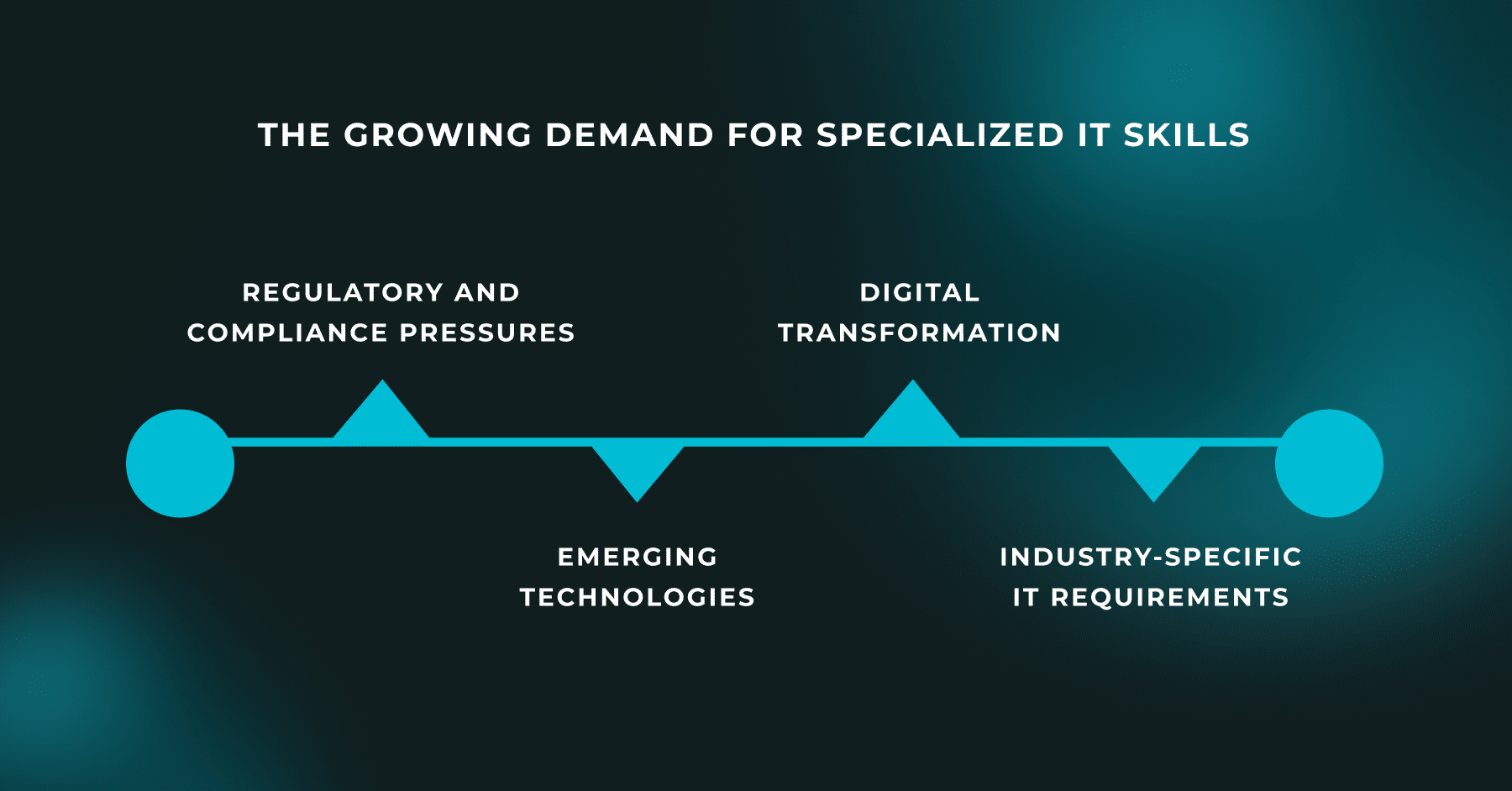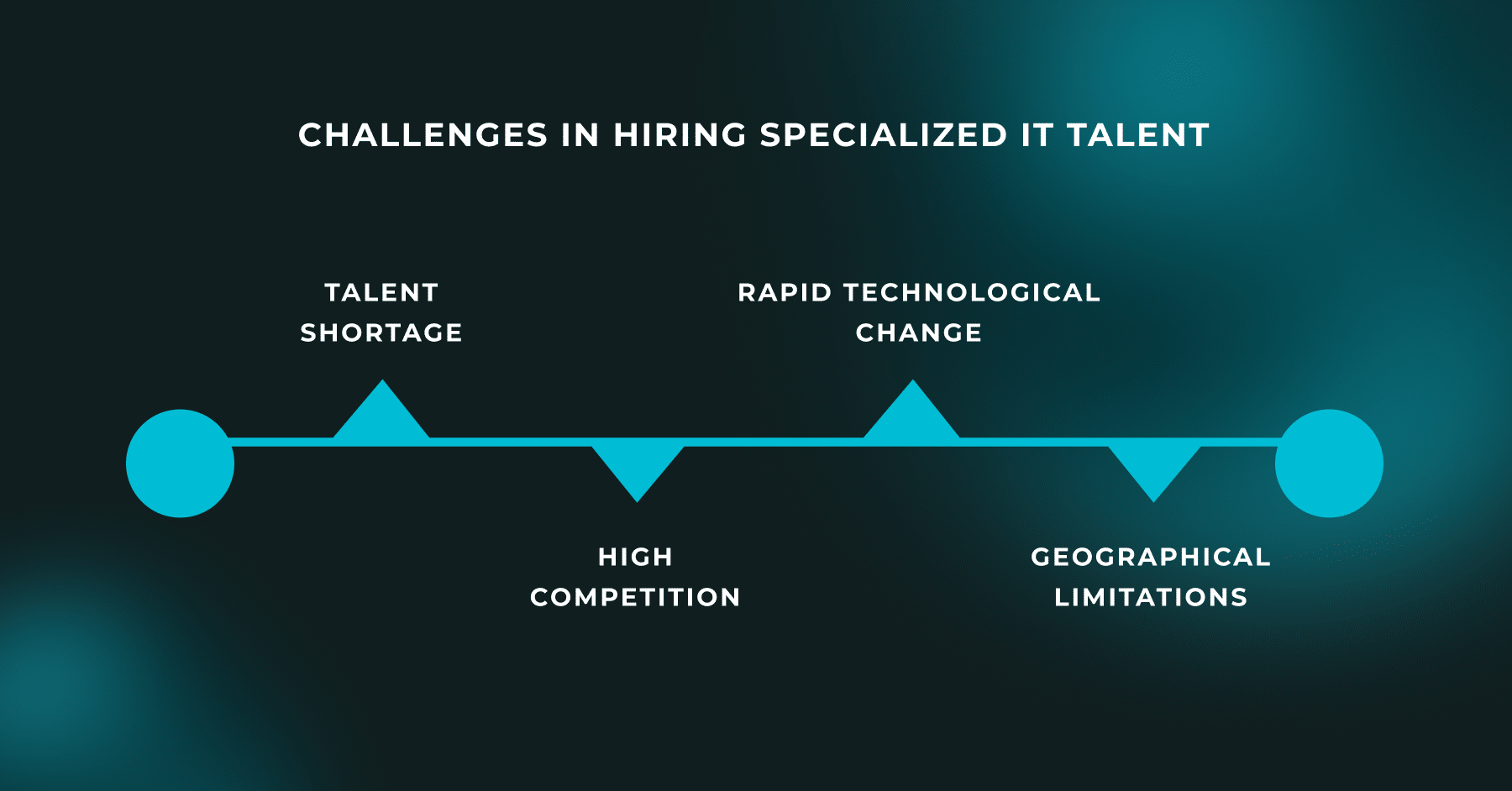IT Staff Augmentation and the Rise of Specialized Skill Sets in 2024
The fast pace of digital transformation has triggered a high need for niche IT talent. Skills like data science, cloud computing, machine learning, and blockchain technology are being sought after — though finding these experts can be difficult. According to studies, 75% of employers struggle to recruit skilled workers, with 76% facing difficulties in the IT sector alone.

However, to address this challenge, organizations must adopt IT staff augmentation — bringing in remote experts to complement their internal teams. This approach allows companies to quickly fill skill gaps and stay competitive in the ever-evolving digital landscape.
This article discusses the growing requests for specialized skill sets in tech and how IT staff augmentation services can help.
Read on!
The Growing Demand for Specialized IT Skills
The increasing need for special IT skills is a trend driven by several factors. Let’s discuss the key ones.

Emerging Technologies
Technologies like artificial intelligence (AI), blockchain, and quantum computing are increasingly becoming popular. This creates a need for workers who can develop and implement this tech effectively.
For context, the global AI market is predicted to hit US$826.70 billion by 2030, a testament to its high adoption rate. Similarly, the blockchain market is forecasted to hit US$943 billion by 2032, increasing the need for blockchain developers and analysts. The problem is that these technologies often require specialized knowledge beyond what typical IT staff possess.
Technologies driving the demand for specialized IT skills in 2024 and beyond:
- AI/ML
- Blockchain
- Cybersecurity
- Cloud Computing
- IoT
- Quantum Computing
- Big Data Analytics
- Extended Reality (XR)
- 5G Technology
- Green IT
These evolving techs highlight the dynamic nature of the 2024 IT industry. As businesses embrace innovation, need for these skills will rise.
Industry-Specific IT Requirements
Different sectors demand unique IT solutions, which call for different expertise. In the medical field, for example, telemedicine and EHR/EMRs are commonplace. This makes knowledge of health informatics and HIPAA compliance essential. Similarly, with the emergence of fintech, expertise in secure transaction processing and regulatory requirements like PCI DSS is crucial in the banking industry.
In retail and e-commerce, skills in managing online shopping platforms, integrating payment gateways, and optimizing user experiences are vital. This includes expertise in CRM systems for personalized marketing and customer satisfaction.
For manufacturing, knowledge of Industrial IoT (IIoT) integration for real-time monitoring and predictive maintenance, along with ERP systems for streamlined business processes, is key.
In education, implementing Learning Management Systems (LMS) and EdTech solutions like virtual classrooms and digital assessments are critical for effective learning experiences.
Entertainment industries require proficiency in managing digital assets and optimizing streaming services for high-quality delivery.
These examples highlight the importance of tailored expertise to meet specific industry IT needs.
Regulatory and Compliance Pressures
IT operations become more challenging when navigating regulatory compliance. For instance, compliance is required with laws like the CCPA in California and the GDPR in Europe. Also, sensitive areas like finance and healthcare often have additional compliance requirements.
Let’s dive into some industry-specific regulations:
- The healthcare sector requires HIPAA compliance to ensure that health info is safe and secure. It sets the standard for electronic transactions and patient privacy.
- The finance sector requires SOX compliance, which demands meticulous record-keeping and tight internal controls to keep financial reports safe.
- In retail, PCI DSS specifies security standards to keep credit card details safe during processing, storage, and transmission.
- Manufacturing companies in the USA are expected to comply with OSHA standards. This guarantees safe working conditions and prevents workplace injuries.
- Education institutions in the USA are required to comply with FERPA. This is to protect student education records while granting parents and eligible students some rights over them.
These regulations call for a mix of legal know-how and technical chops that often go beyond what your typical IT team can handle.
Digital Transformation
Businesses increasingly leverage cloud computing, big data analytics, and IoT to improve operations and customer experiences. According to Statista, global spending on these digital transformations will hit US$3.9 trillion by 2027. However, these improved business functions require more sophisticated IT skill sets.
Digital transformation initiatives often demand customized solutions and extensive technical expertise, leading companies to seek out experts who can drive innovation and ensure successful implementation.
Challenges in Hiring Specialized IT Talent
While the need for niche IT expertise cannot be denied, acquiring such talent has become increasingly difficult in recent years. The following challenges are some of the reasons for this difficulty.

Talent Shortage
The persistent shortage of developers is the biggest challenge in IT recruiting. Reports suggest that at least 95% of IT decision-makers struggle to find candidates with the right skills. This scarcity, particularly acute in niches like AI, machine learning, cybersecurity, cloud technology, automation, software engineering, and modernization, results in fierce competition.
High Competition
As technology-driven businesses multiply, the competition for specialized IT talent has become fierce. Big players like Google, Amazon, and Microsoft dangle attractive compensation and perks, making it tough for smaller firms to compete. They offer not just fat paychecks but also stock options, exciting projects, and great career growth. A study by Gartner shows that 86% of CIOs struggle to compete with these big brands for qualified tech talent, highlighting the intense competitiveness of today’s hiring landscape.
Rapid Technological Change
The rate of technological innovation is unrelenting; it needs ongoing upskilling and adaptation among IT workers. The WEF predicts that by 2030, over a billion jobs will undergo significant changes due to technology. Consequently, around 50% of all workers will require reskilling by 2025 to remain relevant. This means that IT workers must stay up to date on the newest innovations—cloud computing, artificial intelligence, and cybersecurity. This dynamic climate can be challenging for businesses looking for people with both current and future-proof skill sets.
Geographical Limitations
Despite advancements in remote work capabilities, geographical limitations persist as a challenge in hiring IT specialists. Certain regions or countries may have a dearth of experts in specific fields, forcing companies to either settle for less qualified candidates or incur the costs and complexities of relocation or remote collaboration. Additionally, legal and cultural barriers may hinder the recruitment of international talent, further constraining the pool of available talent.
Tackling these challenges involves proactive steps like investing in employee training and development and building a strong employer brand. However, these approaches can be slow to yield the desired result. On the other hand, augmentation is one of the most effective IT skill gap solutions available today. By choosing the ideal IT staff augmentation partner, you can navigate the complexities of augmented IT professionals and stay competitive in today’s digital world.
How IT Staff Augmentation Addresses These Challenges
IT staff augmentation is a smart strategy that tackles various hurdles in IT recruitment. Let’s see how this method can address the challenges above.
Talent Shortage
IT outsourcing and staff augmentation can help with the problem of demand exceeding supply. This approach delivers access to highly skilled labour on a project-by-project basis.
Take Poland, for example. This country is a strategic hub for hiring specialized IT staff in Eastern Europe. Recent data reveals it boasts the highest number of developers in the CEE region, totaling over 400,000 specialists. This means any company struggling to find experts for their projects can tap into this extensive talent pool without hiring and training expenses.
Organizations can swiftly fill skill gaps and meet project deadlines by bringing in external consultants or contractors.
High Competition
With technology booming, companies are constantly racing to attract top talent, which is crucial for driving innovation and staying ahead of the curve.
IT staff augmentation can help here, too. It offers organizations access to a talent pool of highly skilled workers, even those not actively job hunting. Unlike traditional hiring that involves stiff competition with big corporations over salaries and perks, IT staff augmentation pricing model levels the playing field for everyone.
But that’s not all. These specialized experts are often drawn to flexibility and project variety, making them more inclined to collaborate with smaller companies.
Rapid Technological Change
Technology is always evolving, and organizations must keep up to remain competitive. The IT skill augmentation approach can make this possible. By adding remote experts to your team, you gain access to individuals with proven skills and experience gained from diverse business environments. Collaborating with them allows your in-house team to learn about new technologies and software development best practices through knowledge transfer.
Geographical Limitations
Location is no longer a barrier to finding and hiring talent, thanks to the staff augmentation approach.
For example, a small games startup based in the US might encounter difficulties in finding or affording local talent with expertise in UE or Unity 3D development. However, by partnering with an augmentation firm like Newxel, they can access these specialists from major game developer hubs like Ukraine without the need for relocation. With a pool of over 20,000 Game Engines (UE, Unity 3D) developers, there are plenty to choose from.
Newxel Can Help: Case Studies
Choosing the right vendor is crucial for success with niche tech skills augmentation. You need a company that comprehends the IT industry, understands your project’s technical aspects, and can provide the team you need. This is where Newxel excels.
Newxel is the ideal partner for augmenting IT teams, building and running R&D centers, or managing remote software development teams. For over six years, we have delivered top-tier IT staffing solutions to clients in more than 11 countries, helping them assemble successful project teams.
Here are some of our success stories.
AlgoSec and Newxel Collaboration
In 2022, AlgoSec, a global leader in cybersecurity, sought to expand its team of deployment engineers. Partnering with Newxel, they targeted the Turkish market for new talent. Despite facing challenges such as navigating local employment laws and ensuring English proficiency, we successfully hired and onboarded the first deployment specialist within a month, a team that later grew to three.
In addition to hiring, onboarding, HR support, and IT services, our AlgoSec partnership also covered administrative, legal, and financial services, as well as benefits and facilities. This success story highlights the power of strategic staff augmentation in achieving business goals through specialized skill sets and effective partnerships.
Carbyne and Newxel Collaboration
In 2021, emergency response technology solutions provider Carbyne partnered with Newxel to scale their development team in Ukraine. Initially small, the team expanded rapidly under our guidance, acquiring key talents, including a real-time communication software engineer, two DevOps experts, an AQA specialist, and a versatile full-stack developer.
Despite challenges, such as the scarcity of RTC engineers, the collaboration thrived. The Newxel team ensured seamless integration and support, even under wartime conditions. This strategic partnership not only enhanced Carbyne’s capabilities but also highlighted the resilience and dedication of Ukrainian developers, and our commitment to deliver no matter the odds.
See more of our case studies here.
If you need experts in emerging technologies to close your company’s skills gap, you’re in the right place. From game developers to cybersecurity specialists to full-stack developers, Newxel can have your team operational in under five weeks.
In today’s competitive market, where business success hinges on specialized talent, Newxel can help you stay ahead.
Ready to build a dynamic team for success? Contact us today.
Summary
As technology advances, the demand for specialized skills will keep on growing. Fortunately, IT expertise augmentation will always be on hand to match demand with supply, making it an indispensable tool for organizations striving to stay competitive in today’s digital landscape.







